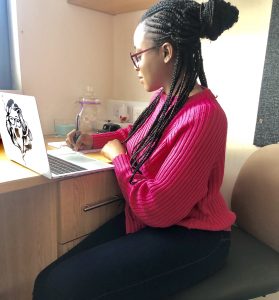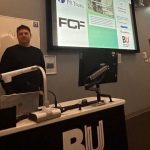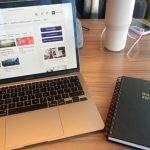 Produced by Guest blogger
Produced by Guest blogger
 Hello, my name is Ijeoma Madukaife, a Public Health Master’s degree student 2018/2019. You are probably asking yourself, am I sure this is the right course for me? Well, my answer is YES!!
Hello, my name is Ijeoma Madukaife, a Public Health Master’s degree student 2018/2019. You are probably asking yourself, am I sure this is the right course for me? Well, my answer is YES!!
First of all, not everyone has it all figured out. So, don’t be too hard on yourself.
Public Health is all about helping people to get a better quality of life and prolonging life: creating awareness, soliciting for policies that are more tailored to seeing to the needs of the population, in relation to basic necessities and health.
I chose this course because I am personally interested in the greater good of people. I love to make impact and this course accounts for the health of a larger population, not just an individual. I have watched myself build confidence and knowledge in research practices and policies that impact the health of the people. In the past, I underestimated the influence that these practices and policies have on a group of people, which then affect the country and the world as whole. It’s like a boomerang. It is very fascinating and very important.
My advice:
- Start all assignments early! Make sure you proof-read your work with the Intended Learning Outcomes (ILOs). I once missed including ‘table of content’ for an assignment because I didn’t attend the lecture and apparently the lecturer stressed on how important it was. Avoidable mistakes are the most painful.
- Always read your feedback, as they show you how to think differently and they contain mistakes that you may repeat throughout the course.
- Attend classes and try to understand each unit. That makes you a good public health analyst and it helps you to stand out. Anything worth doing is worth doing well, so why not be good at what you to?
- The lecturers are kind, so always talk to them when you need help.
- Have fun and keep the faith!! You Only Live Once (YOLO). It is all about balance, critical analysis and planning.
 My best experience is always in the lecture room – when we all interact and throw in ideas and solutions, based on the disease burdens prevalent in our individual countries. The moment you understand that we may be from different backgrounds, but we are all trying to find ways to close the inequality gap in our individual countries – it is a beautiful thing to experience.
My best experience is always in the lecture room – when we all interact and throw in ideas and solutions, based on the disease burdens prevalent in our individual countries. The moment you understand that we may be from different backgrounds, but we are all trying to find ways to close the inequality gap in our individual countries – it is a beautiful thing to experience.
This course has shaped my skills in partnership working, problem solving and health promotion, while expanding my knowledge in effective transferability. I have no doubt that I will thrive in Governmental and Non- Governmental Organizations that I hope to work with and make huge impact wherever I find myself.
I wish you all the best.
By Dorathy Ijeoma Madukaife
MSc Public Health









